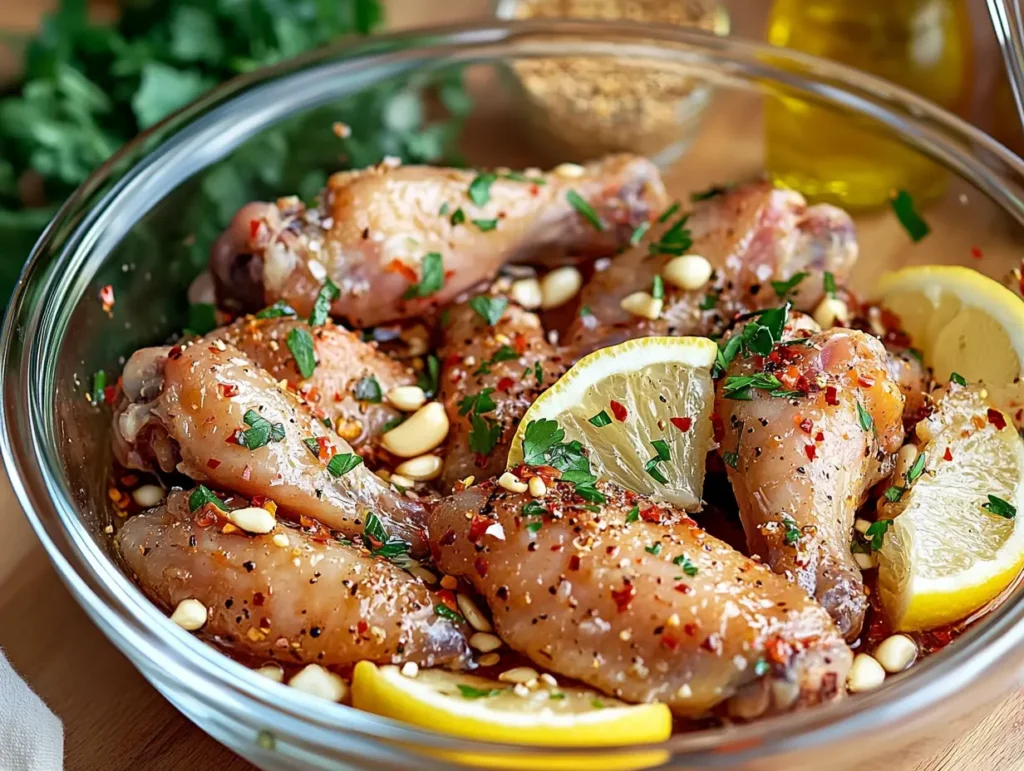Marinating chicken wings is a proven way to enhance flavor, improve tenderness, and keep the meat juicy during cooking. But the question remains: Can I marinate chicken wings for 2 days? While marination is essential for achieving delicious wings, the duration depends on the type of marinade and how it is stored. Over-marinating can lead to mushy meat, while proper techniques ensure perfectly seasoned wings.
Table of Contents

Can I Marinate Chicken Wings For 2 Days ?
For the science behind marination and its effects, explore the Wikipedia article on marination.
What is Marinating?
Marinating is the process of soaking meat in a seasoned liquid to enhance flavor and texture. A typical marinade includes three key components:
- Acids: Citrus juice, vinegar, or yogurt, which help tenderize the meat.
- Oils: Olive oil or sesame oil, which retain moisture and add richness.
- Seasonings: Garlic, herbs, spices, or soy sauce to boost flavor.
When used correctly, marinades create well-balanced flavors and protect the meat during cooking. Learn more about creating the perfect marinade in the formula for chicken marinade.
Can I Marinate Chicken Wings For 2 Days ?
Can You Marinate Chicken Wings for 2 Days?
The safety and effectiveness of marinating chicken wings for 2 days depend on the type of marinade and storage conditions.
1. Acidic Marinades
Acidic marinades (lemon juice, vinegar, etc.) break down proteins quickly. If left too long—beyond 12–24 hours—this can lead to a mushy texture.
2. Enzymatic Marinades
Enzymatic marinades like yogurt or buttermilk are gentler and ideal for extended marination, up to 2 days. These marinades work slowly and create tender, flavorful wings.
3. Proper Storage
- Always marinate chicken in the refrigerator.
- Use airtight containers or resealable plastic bags to prevent contamination.
For a deeper understanding of marination effects, read why marinate chicken before grilling.
Can I Marinate Chicken Wings For 2 Days ?
Benefits of Marinating Chicken Wings
1. Enhanced Flavor
Marinades introduce bold flavors, from sweet and smoky to spicy and tangy, elevating your chicken wings to the next level.
2. Tenderizing the Meat
Acids and enzymatic agents break down muscle fibers, making chicken wings softer and more tender.
3. Moisture Retention
Oils form a protective barrier that locks in moisture, preventing dryness during cooking.
4. Caramelized Crust
Ingredients like honey or brown sugar caramelize during cooking, creating a crispy and flavorful crust.
Food Safety Considerations
Ensuring food safety is essential when marinating chicken wings, particularly for extended periods.
1. Storage Tips
- Always refrigerate chicken while marinating; never leave it at room temperature.
- Use non-reactive containers like glass or plastic. Avoid metal containers, which may react with acids.
2. Spoilage Signs
- Look for changes in smell, texture, or color. Spoiled chicken may have a slimy texture, an unpleasant odor, or discoloration.
- Always discard spoiled chicken and marinade.
3. Handling Marinades
- Do not reuse marinade that has come into contact with raw chicken.
- If you wish to reuse it, boil the marinade to eliminate bacteria before applying it to cooked wings.
Best Practices for Marinating Chicken Wings
1. Balance the Marinade
Use a combination of acids, oils, and seasonings to achieve the desired flavor and texture.
2. Follow Recommended Times
- Acidic marinades: 2–12 hours.
- Enzymatic marinades: Up to 48 hours (2 days).
3. Ensure Even Coverage
- Coat chicken wings evenly with the marinade.
- Use resealable plastic bags or containers to allow even absorption of flavors.
For tips on achieving crispier textures post-marination, check out how to sauce wings while keeping them crispy.
Can I Marinate Chicken Wings For 2 Days ?
Alternatives to Long Marination
If marinating for 2 days isn’t practical, here are alternatives:
1. Dry Rubs
Dry rubs are a blend of spices and herbs applied directly to the wings. They create a flavorful crust without needing extended marination.
2. Brining
Brining involves soaking chicken in a saltwater solution to enhance flavor and juiciness. It works well for chicken wings that will be grilled or fried.
3. Post-Cooking Sauces
Toss cooked chicken wings in sauce to enhance flavor. For oven-based methods, explore crispy chicken wings without frying.
Can I Marinate Chicken Wings For 2 Days ?
Recipes for Marinated Chicken Wings
1. Asian-Style Wings
- Ingredients: Soy sauce, ginger, garlic, sesame oil, and honey.
- Duration: 2–12 hours.
- Flavor Profile: Savory and slightly sweet.
2. Spicy Buffalo Wings
- Ingredients: Hot sauce, butter, vinegar, and paprika.
- Duration: 1–4 hours.
- Flavor Profile: Spicy with tangy undertones.
3. Yogurt-Marinated Wings
- Ingredients: Greek yogurt, cumin, garlic, and lemon juice.
- Duration: 12–48 hours.
- Flavor Profile: Creamy and tangy.
FAQs About Marinating Chicken Wings
1. Is marinating chicken wings for 2 days safe?
Yes, but only with yogurt or buttermilk-based marinades. Acidic marinades should be limited to shorter durations.
2. What happens if chicken wings are over-marinated?
Over-marination can result in a mushy texture and overpowering flavor.
3. Can I freeze marinated wings?
Yes, marinated wings can be frozen in freezer-safe bags and thawed before cooking.
4. How can I tell if marinated wings have spoiled?
Signs of spoilage include a foul odor, slimy texture, and discoloration.
Can I Marinate Chicken Wings For 2 Days ?
Conclusion
Marinating chicken wings for two days can deliver incredible results when done correctly. Yogurt or buttermilk-based marinades are ideal for extended marination, while acidic marinades should be used for shorter periods to prevent texture issues. Whether you’re preparing tangy buffalo wings or savory Asian-style wings, proper marination elevates flavor and tenderness.
For more inspiration, explore the formula for chicken marinade and learn about why marinate chicken before grilling. With the right techniques and ingredients, your chicken wings will always be a hit!
